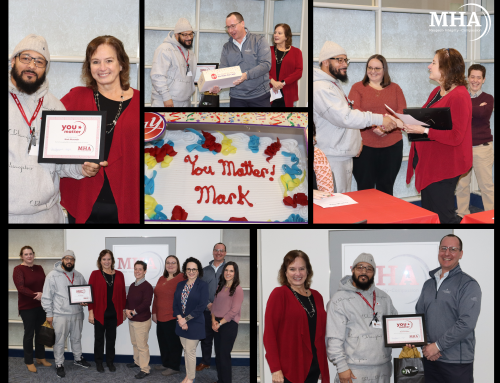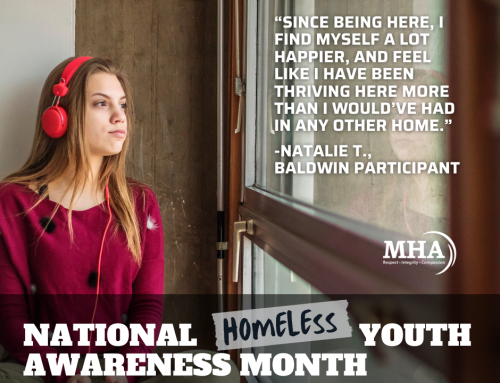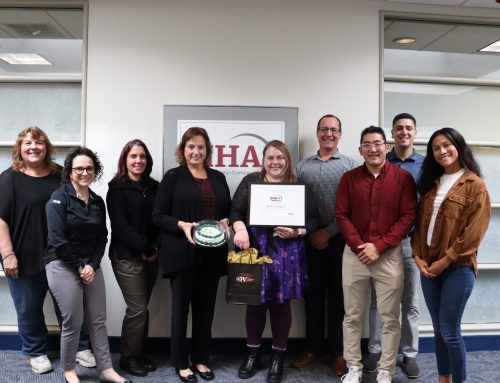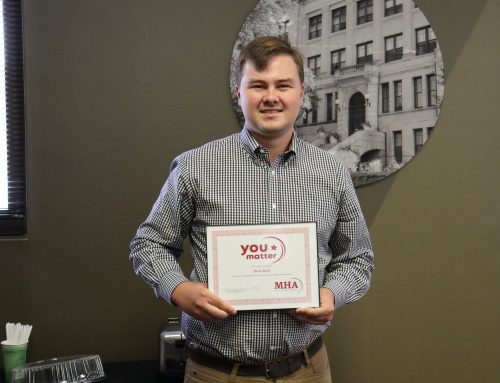
“Victoria” had been a resident of an MHA Youth In Transition residential program. Now, with guidance and support from Florence Johnson, MA, LMHA, Clinical Case Manager, Youth In Transition (YIT) Programs for MHA, Victoria has moved into her first apartment. That is cause for celebration!
“Being in my own apartment is a lot better than living in a program,” says 20-year-old Victoria, confidently. “I love living by myself. Maybe that something has to do with being in foster care since I was about 2, and getting adopted when I was 4, and then going back into custody when I was 8. Being on my own is better.”
MHA’s Youth In Transition helps young adults, including Victoria, to overcome barriers or personal challenges as they develop skills and build networks they need to live their best life, with the greatest degree of independence. The program serves transitional aged youth 18 to 22 who are experiencing cognitive or mental health challenges or related conditions. Victoria had many years involvement with the Massachusetts Department of Children and Families (DCF) during her childhood, and in her young adulthood faced some challenges. With guidance and support, notably from Florence, she has overcome barriers and is now living in her own apartment and working full-time.
“I work in a company called Phyx Repairs, which is a 13-minute walk from my apartment,” Victoria explains. “I’m learning how to do repairs like fixing cracked phone screens and replacing batteries in computers. I’m also the assistant who helps to open the shop and keep it clean. Sometimes I help with customers, too, like when people drop off their repairs.”
How did Victoria get the job? “I met my boss through a work program when I was 17. I wasn’t doing well at the time and got laid off, but last summer he reached out to see how I was doing. He asked would I like to come back and try working for him again. I said yes and it’s been good. I didn’t really have a specific interest in electronics, but I like hands-on things and little parts and how they all work. Now I work Monday through Friday, so it’s pretty much a full-time job.”
Victoria says having an income is important to being independent, and so is having an employer who is understanding. “It’s a small business so I know the guy who owns it and I can have a little flexibility with my schedule sometimes. He’s understanding like that. I had plenty of other jobs where they were not always so understanding. It’s good for both of us, actually.”
What does Victoria like best about living on her own? “I like to cook, fiddling with different things. Right now I watch videos on food and cooking, and I learn from my mistakes and keep getting better. I’d like to know some more of the art and science of cooking and I’ve been thinking about culinary school and actually learning about food and flavors and techniques. I am a visual learner, so I think I’ll like culinary school. Having a steady job and my own place now, I think I’ll be able to do that.”
Victoria says she has a close personal relationship with Florence: “She was the staff member I liked right off the bat. Maybe it was her ‘dad’ jokes! She is always very understanding, and I like when people try to understand and help me through whatever problems I was going through.”
“From the start I loved Victoria’s her sense of humor,” says Florence. “She could tell that not all of her staff picked up on her quirkiness, but I did, which helped us connect. Victoria discovered that she could turn to me, and that confidence really helped enhance our relationship. I’m ‘safe’ to Victoria, and being a licensed mental health counselor, I have been able to help her help herself.”
“Florence made the connection for me to where I’m living now,” says Victoria. “I don’t have a credit history and Florence put in a good word for me. That helped the landlord decide to rent to me.”
“One of the things that’s super cool is Victoria was eligible for her first month’s rent as part of a grant from MHA,” said Florence. “MHA also helped her with donations of things she needed for her apartment. With all the good things I see in Victoria, I know she will flourish on her own and do really well. She is a go-getter who always tries, and that’s an important part of succeeding in a lot of life.”
Victoria continues to connect with Florence two or three times a week, and they text regularly as well. “Florence is one of the biggest helps for me mentally and just generally. It’s true.”
“Victoria has done such a great job and I’m so pleased with her progress,” says Florence. “I knew she would excel when she left Youth In Transition. She was ready.”





